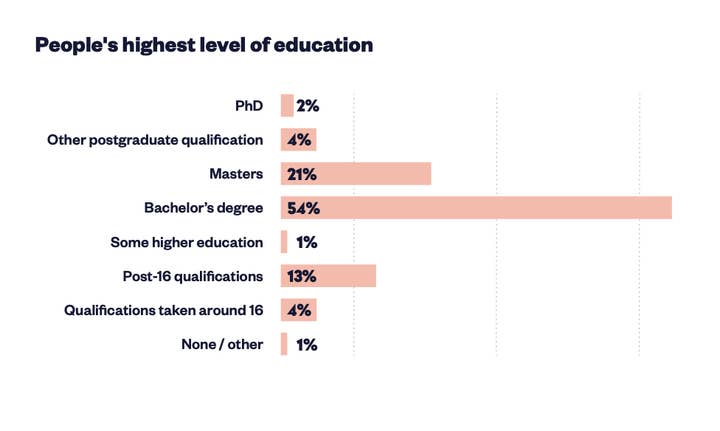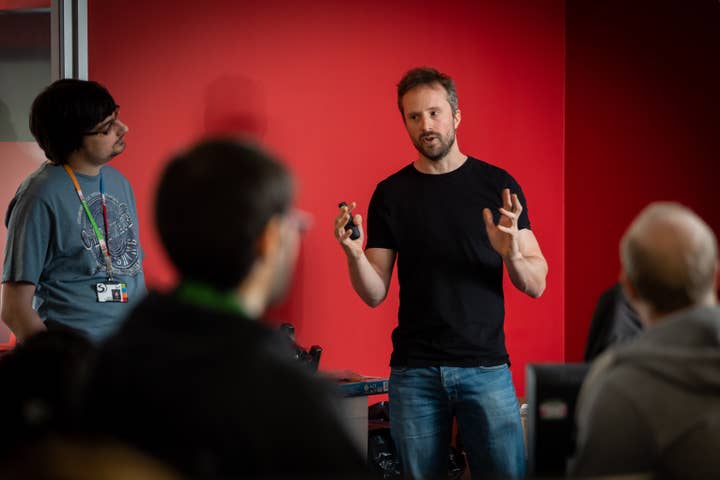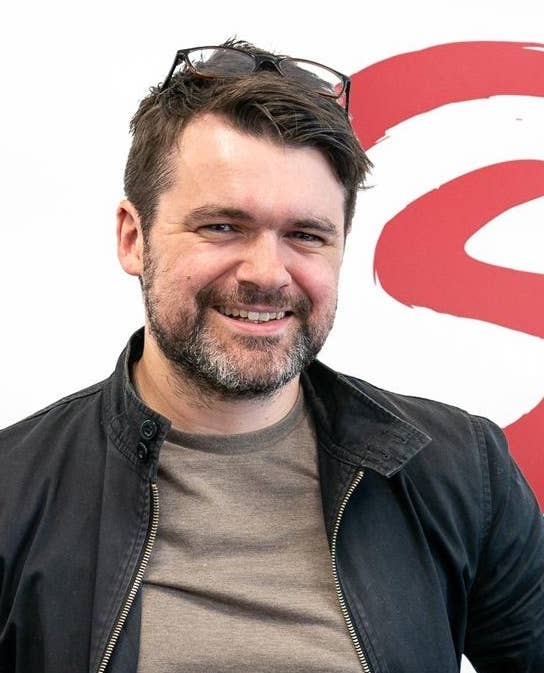What's wrong with the UK talent pipeline and how to improve it
Sumo's Harinder Sangha, Kieran Holland, and Jacob Habgood tell the GamesIndustry.biz Academy about ways UK companies can diversify how they access talent
It's nothing new at this stage that the UK games industry is predominantly white and male.
We explored the results of UKIE's games industry census on many occasions on the GamesIndustry.biz Academy, trying to provide concrete solutions to some of the issues highlighted by the data from the UK trade body.
From understanding the barriers that Black professionals face, to questioning whether it's open to working class people, or how to approach mental health issues in the workplace, we have attempted to provide resources that directly answer the flaws highlighted by the census -- some of them going way beyond the UK borders.
One aspect we haven't touched upon in detail is education.
"81% of games workers are educated to at least degree-level, significantly above that of the overall UK workforce at 23% and the cultural and creative industries generally at 56%," wrote Dr Mark Taylor, senior lecturer at the Sheffield Methods Institute and author of census.
The games industry workforce in the UK is a fairly homogenous block -- companies tend to recruit from the same sources, whether recruitment agencies or universities directly. Transforming the UK talent pipeline has become a necessity if the games industry is to tackle its diversity problem.
To mark Games Careers Week, which runs until April 2, we caught up with Sumo Leamington operations director Harinder Sangha, Sumo Digital's group talent acquisition manager Kieran Holland and Sumo Group's director of education partnerships Jacob Habgood about the current issues with the UK talent pool and what games companies can do to help improve it.
The issues with the UK talent pool
- Lack of diversity
The UK is home to many game studios (2,108 as of 2016, to be exact), which are all hunting for the same talent. It can be really difficult to find the right person for the right role, Sangha argues, and even more so to find talent that doesn't come from the same mold.
"I've got a ten-year-old daughter," she says. "She will say to me that she wants to be a scientist. But how do we keep these girls wanting to follow that [path]? Because they're still dropping out from [STEM studies]. We don't really know why they're dropping out, but they are. I want my daughter to continue to know that there's a career here. So we need to be visible.

"As a company we're going into schools whenever we can and making sure that they can see women in these roles, as well as people of colour. Because it's more than just women. So they say: 'Oh, in the future, I could be there'. It's not just for white males, it is for everyone."
It's a catch-22: the UK talent pipeline isn't diverse because there's little diversity currently visible in games. But there can't be more diversity in the industry if the pipeline is not more diverse.
UK companies need to explore routes beyond the traditional games education path if they wish to bring enduring diversity, which will benefit everyone.
"I think games courses struggle to deliver diversity because there isn't a critical mass amongst those courses," Habgood adds. "For as long as those courses remain 90% white male, it's very difficult for people outside of those groups to consider themselves as belonging within that same group. That is a real challenge.
"Marie-Claire [Isaaman, CEO] in Women in Games did some great work at Norwich, turning around the gender balance on her course, and that really did focus on using a cohort of female students to promote the course to successive generations. That was a really great approach. When you haven't got that many people already from certain backgrounds in the games industry, it's hard to get that message across."
- Practical barriers
There are also practical barriers in the way topics are organised at a school level, which makes it difficult to attract kids to STEM studies.
"For as long as courses remain 90% white male, it's very difficult for people outside of those groups to consider themselves as belonging"Jacob Habgood
"I was talking to the British Computer Society this morning about the issues of even simple things like timetabling," says Habgood. "The fact that GCSE computer science will be time tabled at the same time as drama or art... makes it difficult for people to take both those subjects at school.The fact that computer science isn't something that you have to take at GCSE [level] to do it at A Level, and you don't have to take an A Level to do a degree level...
"In fact, my own daughter has just conveyed to me, as she's going to take her GCSE options, that: 'Well I don't really need to take it because I could always take it later on.' And I think that's unfortunate and there are some problems that need to be addressed there that will help with gender balance."
Prioritising other topics because of practical reasons ultimately means kids are less likely to be aware of the career options linked to STEM. The earlier these topics are introduced to children, the earlier they can realise what they can do with these skills, the earlier they can see games as a career path.
- Small talent pool and international competition
As already touched upon, there are a lot of games companies in the UK, and the talent pool is a lot smaller than these companies' appetites, Holland says. If it is to stay at the forefront of the global market, the UK needs to find talent from more sources.
"We are growing so fast and the pool of available talents just isn't growing at the same speed"Kieran Holland
"We're all fighting for relevance in the pool of available talents in the UK, so it becomes incredibly challenging," Holland adds. "We are growing so fast and the pool of available talents just isn't growing at the same speed. It's one of our biggest challenges: how do we make sure that we are offering the door to entry and creating the right programmes in the right places, to bring in a diverse workforce that's large enough to be able to fulfil a lot of our needs?
"And the other challenge -- it's a smaller one but it is true -- is there is an element of brain drain to studios outside of the UK. There's some fantastic studios in Europe, Scandinavia, the US and beyond, where we do lose some of our fantastic talent. My team regularly reaches out to talent who have come from the UK and now exists in studios outside of the UK, asking if they want to come back. It's a very acute problem and it's getting harder, year by year."
- The industry relies too much on graduate talent
Finally, the UK games industry has historically relied on graduate talent to make the most of its workforce, which leads to that issue we already identified of talent coming from a homogenous block.
Looking back at the UKIE census data, 54% of UK workers have a Bachelor's degree as their highest level of education, while it's a masters for 21%. As you can see in the graph below, there's little outside these two options.

"I think the games industry as it's grown up has been reliant -- certainly for a long period -- on graduate talent because it needs people so quickly, it's been expanding so quickly and that's the only way you can fulfill those roles in that time scale," Habgood says. "But hopefully as we go forward we'll be able to think more long term and introduce opportunities at a younger level."
Sangha also points out that some studios may see bringing in a graduate as an easy solution to their recruitment need, without necessarily setting aside the resources to grow that talent once they're in.
"You're not doing right by your existing team or that graduate if you can't support them and that's really important," she says. "It's not just throwing them in at the deep end. It's really about giving them that opportunity so that they can grow. There is a commitment of time to be able to make this work."
How can UK studios help improve the UK talent pipeline
- Engage with students of all ages to deliver aspiration
Sumo's aim, which the team believes other studios should be following, is to create new entry points into the industry. And that involves talking to students of all ages, from school age to university level, to show them what working in games actually means.
"It's all about delivering aspiration to an area where it doesn't currently exist"Kieran Holland
"It's all about delivering aspiration to an area where it doesn't currently exist," Holland says. "So we have to think differently about: how do we put the door to entry there? We've got just to talk to school, people who could potentially be our developers of the future. The pool of available talents is our challenge and we know that we struggle to recruit experience -- all studios struggle to recruit experienced people that they need. So we need to build talent."
Holland wishes studios would commit to going into a number of schools every year to talk about opportunities in developing careers in games. That would also help convey that games is a strong industry, as parents and teachers are also typically misinformed about that aspect.
"It hasn't yet got the reputation as a place where you can build a rewarding, secure career -- both of which are true. I think a lot of parents [and] teachers out there aren't aware of the opportunities there are in developing a career in gaming. It's on us to work together to start delivering aspiration."

It's also about showing the wide range of jobs available in the industry. Sangha points out that many young people still incorrectly believe that coding is all there is to working in games. And that's because the UK industry lacks advocates to show what else there is.
"That's a thing that we as an industry really need to get across to people," Sangha says. "The industry in the UK is still relatively young but it's a profitable industry. Some children are playing some games but have no idea they're made in the UK. What we need to do as an industry, is for people to realise that actually there are so many brilliant amazing things that are happening here and you don't have to be a coder.
"What we need is for people to realise that there are so many brilliant things that are happening here and you don't have to be a coder"Harinder Sangha
"I'm born and bred from Leamington Spa where we know there are so many studios [but] I never knew. I grew up on a council estate, [I'm] female, Asian -- my parents, if I'd have said 'I really want to go work in games' they'd been like: 'I don't think so'. And that's the thing! Leamington is a small town, some of the biggest games that are on Xbox are coming out of Leamington Spa, and yet, people just don't realise -- people with a background similar to mine, you'd never get to them. That's what we need to do to get to them."
Holland takes artists as an example of a profession where the games industry is rarely seen as a potential career path.
"There are so many fundamentally strong artists who do not realise that they could do what they do as a career," he says. "Whether it's concepting, design, 3D, environment -- there's so many opportunities. And there's a lot of talent out there that we're not even aware of and they're not aware of. There's a disconnect. And it's that stuff: having conversations with teachers and parents to deliver aspiration for those individuals to realise that there is a real career."
- Create apprenticeship programmes
One way game companies can diversify access to the games industry, and one that Habgood is quite passionate about, is through apprenticeship programmes.
It's at the core of the Sumo Digital Academy, which aims at creating a template for paid apprenticeships in the industry. It currently focuses on game programming and took on its first trainees in September 2020.
If you're unfamiliar with apprenticeship levels, it's worth mentioning that each level has an education equivalent:
- Level 2 = GCSE
- Level 3 = A Level
- Levels 4 and 5 = foundation degrees or higher education certificates equivalents
- Level 6 = Bachelor's degree
- Level 7 = Masters degree

"We've created a Level 7 game programming apprenticeship and the idea with that is to be able to bring people in from different graduate backgrounds," Habgood says. "So, we've already identified in this conversation that there is an imbalance in terms of gender and in terms of general background from games courses -- even maths and physics degrees often have a better gender balance than games programming degrees. So the ability to take a talented physicist or mathematician and bring them through a programme in which they learn how to use the right kinds of game engines and programming languages that we use in the games industry, allows us to diversify that talent pool.
"And that's something that's been developed with partners for the whole industry. So once apprenticeship programs are in place, it's not something that Sumo owns, it's something that any games company in the UK could use to draw down on their apprenticeship levy and send their students to an apprenticeship program on these lines."
Sumo's programme gives its trainees experience, training and get them developing projects and working together in a studio-like environment so that they've got the skills that they need to obtain junior programming roles.
While this specific example applies to those with a graduate background, lowering apprenticeships levels would help a lot with diversifying the UK talent pool, Habgood says, and that is something companies should look into doing.
"We've done the Level 7 apprenticeships for undergraduates because we know there's a lot of talent out there and it's a good route to pursue. But I think in the long term for the industry, if you could have Level 3 apprenticeships, Level 4 apprenticeships, then that would really start to bring in a more diverse and exciting talent."

- Have internship programmes
Internships are also an invaluable way to reach talent. And let's say it loud and clear so there's no ambiguity: you need to pay your interns. Unpaid internships perpetuate privilege, and if your goal is to bring people from underrepresented backgrounds, not paying them is not the way. It is also humanely the right thing to do.
You can learn more about this in our article about accessing the games industry from a working class background.
Sumo-owned The Chinese Room debuted a six-month internship programme in 2020, which doesn't require prior experience in games and pays at a rate equivalent to permanent entry roles. It offers flexible hours for those who can't commute easily or have other responsibilities as carers. The idea was to remove as many obstacles as possible to reach candidates from underrepresented backgrounds.

"[With] the internship, the idea is that we attract that talent, put them through some really interesting projects that illicit some of their experience, for us to assess whether they're going to be successful in their role in future and, if so, we'll offer them a full-time role at the end of it," Holland explains. "And of course -- I probably overuse this term but I'll say it again -- putting the door to entry in different places.
"The outcome was we brought in a couple of individuals from areas [where] a career in gaming wasn't an obvious choice. And now building a career in gaming [will be] seen as an opportunity in areas where it previously wasn't."
The short term gain for the company running internships is minimal, Holland warns, but in the long term, it's an invaluable tool. He adds that it's an "awful lot of work" to set it up.
"The doors to entry are so mature where they currently exist, it's quite easy to put an advert on jobs.gamesindustry.biz and get the candidates that you need. It's much more fragmented if you want to put the opportunity out into areas where it doesn't currently exist. So making sure that we're opening up and targeting as wide as we can is a challenge. [You want to make] it as fair as possible -- because this is being inclusive of all underrepresented groups. So there's a lot of prep work in terms of getting the roles in front of people at schools in maybe less affluent areas.
"Making sure that we're opening up and targeting as wide as we can is a challenge"Kieran Holland
"Of course, the biggest challenge is making sure that we've got the time, resource and space to be able to upskill the individuals we bring in. The whole point of this exercise isn't to get a token number of candidates out of it on day one... it's a longer term goal.
"This is a pilot essentially, to say: does it work? And if it does, we're going to want to do this on an annual basis, and potentially at more studios and not just the Chinese Room. The goal being that we try and get candidates who wouldn't be applying for our existing roles, wouldn't be applying through to the [Sumo] Academy, or through the graduate schemes, or through any of our junior positions because either they wouldn't feel that they have the skills, don't feel they're capable, or simply don't know that it's an opportunity for them, because they haven't seen this career put in front of them before."
- Use the right tools to target a wider talent pool of experienced talent
Finally, when it comes to reaching out to experienced talent, you once again need to have the right processes in place to make sure you are as inclusive as possible.
"We have to turn on as many taps as we possibly can to engage talent, whether that's just advertising, targeted sourcing, utilising recruitment agencies," Holland says. "But again, within that, it's critical that we're putting across an advert, a job spec, an approach that doesn't exclude certain groups, whether we do that inadvertently or not. It's really important that we just make sure we take the right steps to do that."
"We know we lose some really good talent if we allow candidates to sift themselves out because they may not feel that they're right"Kieran Holland
One of the tools you can use is Kat Matfield's gender decoder for instance, which flags gender-coded language in your ads. Sumo also uses it to ensure that its job adverts don't contain too much granularity around the skills and experience required, which would put candidates off, as people from marginalised genders or backgrounds tend to feel they need to tick as many of those boxes before applying.
"We want to be able to make that decision as to whether they're the right fit rather than them potentially sifting themselves out," Holland says. "We know we lose some really good talent if we allow candidates to sift themselves out because they may not feel that they're right, whereas actually we see them and think that they'll potentially be a really good fit."
- Make sure you have the right retention tools
It's worth mentioning that delivering aspiration to a wider range of people and bringing in diversity is only one half of the journey. You need to build a culture that is safe and inclusive, or all your efforts will have been in vain.
"One of the things that we do look at from a studio perspective is ensuring that once they're here, they stay here," Sangha says. "We need to make sure that things are in place [such as] flexible working times. [Within Sumo Group] we can decide ourselves what our working hours are and we decided in Leamington to bring our core hours from 10am till 4pm. But bringing that to 3pm, for instance, just means that as parents we can pick our kids up. There's this whole level of understanding and that's something, as a group, we work really hard on that trust."
If you want to learn more about how to retain your staff, we have a GamesIndustry.biz Academy guide for that right here. Focusing on retention and promotion, we also recently looked at the barriers facing Black talent in games.

Advice for studios with fewer resources
The team at Sumo is aware of the privilege that comes with working for a big company, giving them access to more resources. Holland jokes that he always wishes there were more, but is also keen to give advice on where to start when you're a smaller firm.
"If you want to encourage bringing diversity into the studio, [you've] got to do it in a way that's manageable, meaningful, and will actually make a difference. So a smaller studio it's just about when they're in making sure that you've got the right processes in place -- the right training, mentoring, studying, tools, whatever it might be, to bring [new recruits] up to speed."
Look at developing pools that aren't currently tapped for talent, and keep your efforts focused. Trying to solve both the gender imbalance and the abysmal lack of representation of people of colour in games at the same time would be a challenge for instance.
"It is very challenging -- being able to get out to those individuals is really fragmented," Holland continues. "There's no easy route to get to them. It took an awful lot of work when we started -- a lot of late evenings to get our internship in the right place.
"Don't put so much pressure on yourself by feeling that you have to do everything all at once, because it's just too big a challenge"Harinder Sangha
"And so my advice would be potentially to look at their studio and where there maybe is underrepresentation, and just make sure that they're not over committing, because they need to make this work. So make sure that you're being realistic about what you can deliver and to what scale."
You can't do everything all at once, Sangha agrees, saying you have to break it out into small steps and reach out to the appropriate organisations for help.
"If you want to increase the women that you have in your teams, reach out to Women in Games and see what they can do for you," she says. "Start going through social media sites, that's a really quick easy cheap thing to do. If it is trying to hit other groups, so the BAME community for instance, do your research and go see [them].
"Find the places where you can go locally. Don't put so much pressure on yourself by feeling that you have to do everything all at once, because it's just too big a challenge. It's too big a challenge for us, so if you're a small team you're not gonna succeed in a way that you want to and you'll feel you failed when it's not your fault. You need to go back and just try and tackle one at a time."
Habgood adds that it's also a learning process -- you need to be ready to fail to some degree and learn how to get better as you go.
"It's not like you can get it sorted in one year, it's something that you have to constantly refine and feedback into. I think we've still got a lot to learn as an industry about how to approach that in the right way. There are some incredible initiatives, boot camps, training and programming and things that are going on in the industry that I think will help. But we're still all developing this and it's going to take a few years to get there."
Concluding our chat, Holland implored every studio to balance their immediate recruitment needs with future goals.
"So our immediate need is a grad, it's a programmer, it's a senior artist. But the pool of available talent is growing at a certain speed; the industry is growing at a much faster speed. The challenge we were experiencing two years ago I think is much more acute now. And I expect it will continue to be more acute. It's on all of us to go out, deliver the aspiration that the gaming industry is a really valid career choice and that will drive a much bigger pool of available talent for us all to fish from in the future."
To read more about recruitment, retention, and how to build a career in games, browse through the Working in Games section of the GamesIndustry.biz Academy

